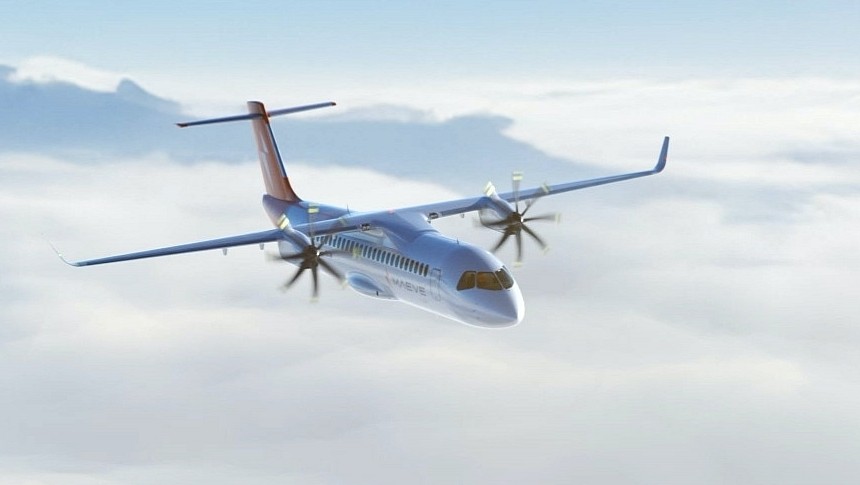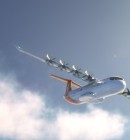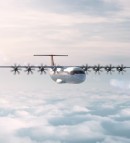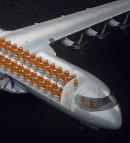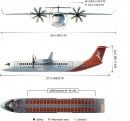Maeve M80 is the name of a fresh aircraft concept that could take regional aviation by storm in just a few years. It's different from any other alternative aircraft because it was developed based on the customer feedback provided for the Dutch startup's original concept, the all-electric Maeve 01.
Earlier this year, a Dutch startup connected to the reputable TU Delft Campus unveiled the design of a zero-emission, battery-powered aircraft. The Maeve 01 was described as a 44-passenger airliner with a 250 nautical miles (460 km) range and the ability to be fully recharged in just half an hour, thanks to an innovative, fully robotized process.
The Maeve 01 sounded promising, but the feedback from potential customers wasn't as positive. They needed a much longer range and a bigger capacity in order to even consider regional operations. The Maeve team got to work and ended up changing its concept drastically. The new product is a hybrid-electric version with a double capacity and upgraded performance.
Renamed M80, the new aircraft ditched the original four electric motors in favor of a hybrid-electric configuration. The M80 is also seven meters (23 feet) longer than the previous model and boasts a shorter wing.
The 80-seater will be able to cover up to 800 nautical miles (1,480 km), with a maximum cruise speed of 400 knots (740 kph). The main idea is to match the performance of existing turboprops while still offering considerable benefits in terms of lower emissions and operational costs.
The state-of-the-art design, combined with the hybrid-electric propulsion, will result in fuel consumption reduction of up to 40% compared to regional jets, which translates to reduced emission levels and costs. Plus, the M80 will also be certified to run on power-to-liquid fuels based on hydrogen and other types of alternative fuels, which could further cut emissions by up to 95%.
When it comes to operational costs, the Dutch aircraft promises a 25% lower trip cost compared to regional jets of the same size and a 20% lower seat-mile cost compared to turboprops in the same size category.
According to the Dutch company's chief technical officer, Martin Nuesseler, the propulsion system will come from one of the industry's giants, and it will be the first commercial application of that new technology.
The bad news is that the drastic design changes also mean delaying the certification process. While the initial electric airliner was due to start flying in 2028 and get the green light by 2030, the M80 aims to be fully certified by 2031.
In the meantime, Maeve is negotiating with potential customers among the top air carriers in the world and is also considering expanding its operations to Germany in the near future.
The Maeve 01 sounded promising, but the feedback from potential customers wasn't as positive. They needed a much longer range and a bigger capacity in order to even consider regional operations. The Maeve team got to work and ended up changing its concept drastically. The new product is a hybrid-electric version with a double capacity and upgraded performance.
Renamed M80, the new aircraft ditched the original four electric motors in favor of a hybrid-electric configuration. The M80 is also seven meters (23 feet) longer than the previous model and boasts a shorter wing.
The 80-seater will be able to cover up to 800 nautical miles (1,480 km), with a maximum cruise speed of 400 knots (740 kph). The main idea is to match the performance of existing turboprops while still offering considerable benefits in terms of lower emissions and operational costs.
The state-of-the-art design, combined with the hybrid-electric propulsion, will result in fuel consumption reduction of up to 40% compared to regional jets, which translates to reduced emission levels and costs. Plus, the M80 will also be certified to run on power-to-liquid fuels based on hydrogen and other types of alternative fuels, which could further cut emissions by up to 95%.
When it comes to operational costs, the Dutch aircraft promises a 25% lower trip cost compared to regional jets of the same size and a 20% lower seat-mile cost compared to turboprops in the same size category.
According to the Dutch company's chief technical officer, Martin Nuesseler, the propulsion system will come from one of the industry's giants, and it will be the first commercial application of that new technology.
The bad news is that the drastic design changes also mean delaying the certification process. While the initial electric airliner was due to start flying in 2028 and get the green light by 2030, the M80 aims to be fully certified by 2031.
In the meantime, Maeve is negotiating with potential customers among the top air carriers in the world and is also considering expanding its operations to Germany in the near future.
